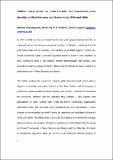Files in this item
Political travel across the ‘Iron Curtain’ and Communist youth identities in West Germany and Greece in the 1970s and 1980s
Item metadata
| dc.contributor.author | Papadogiannis, Nikolaos | |
| dc.date.accessioned | 2017-07-22T23:33:26Z | |
| dc.date.available | 2017-07-22T23:33:26Z | |
| dc.date.issued | 2016-01-22 | |
| dc.identifier | 240851226 | |
| dc.identifier | 32a86de9-9876-4511-b5b2-9c4fc2d8d60e | |
| dc.identifier | 84955072615 | |
| dc.identifier | 000380151500009 | |
| dc.identifier.citation | Papadogiannis , N 2016 , ' Political travel across the ‘Iron Curtain’ and Communist youth identities in West Germany and Greece in the 1970s and 1980s ' , European Review of History: Revue européenne d'histoire , vol. 23 , no. 3 , pp. 526-553 . https://doi.org/10.1080/13507486.2015.1113935 | en |
| dc.identifier.issn | 1350-7486 | |
| dc.identifier.other | ORCID: /0000-0002-3521-8152/work/87846167 | |
| dc.identifier.uri | https://hdl.handle.net/10023/11265 | |
| dc.description.abstract | This article explores tours through the Iron Curtain arranged by West German and Greek pro-Soviet Communist youth groups, in an attempt to shed light on the transformation of European youth cultures beyond the ‘Americanisation’ story. It argues that the concept of the ‘black box’, employed by Rob Kroes to describe the influence of American cultural patterns on Western European youth, also applies to the reception of Eastern Bloc policies and norms by the Communists under study. Such selective reception was part of these groups’ efforts to devise a modernity alternative to the ‘capitalist’ one, an alternative modernity which tours across the Iron Curtain would help establish. Nevertheless, the organisers did not wish such travel to help eliminate American/Western influences on youth lifestyles entirely: the article analyses the excursions’ aims with regard to two core components of youth lifestyles in Western Europe since the 1960s, which have been affected by intra-Western flows, the spirit of ‘doing one’s own thing’ and transformations of sexual practices. The article also addresses the experience of the travellers in question, showing that they felt an unresolved tension: the tours neither served as a means of Sovietisation nor as an impulse to develop an openly anti-Soviet stance. | |
| dc.format.extent | 28 | |
| dc.format.extent | 447747 | |
| dc.language.iso | eng | |
| dc.relation.ispartof | European Review of History: Revue européenne d'histoire | en |
| dc.subject | Greece | en |
| dc.subject | West Germany | en |
| dc.subject | Communism | en |
| dc.subject | Travel | en |
| dc.subject | D901 Europe (General) | en |
| dc.subject | DF Greece | en |
| dc.subject | DD Germany | en |
| dc.subject.lcc | D901 | en |
| dc.subject.lcc | DF | en |
| dc.subject.lcc | DD | en |
| dc.title | Political travel across the ‘Iron Curtain’ and Communist youth identities in West Germany and Greece in the 1970s and 1980s | en |
| dc.type | Journal article | en |
| dc.contributor.institution | University of St Andrews. School of History | en |
| dc.identifier.doi | 10.1080/13507486.2015.1113935 | |
| dc.description.status | Peer reviewed | en |
| dc.date.embargoedUntil | 2017-07-22 | |
| dc.identifier.url | http://www.tandfonline.com/doi/abs/10.1080/13507486.2015.1113935 | en |
This item appears in the following Collection(s)
Items in the St Andrews Research Repository are protected by copyright, with all rights reserved, unless otherwise indicated.

